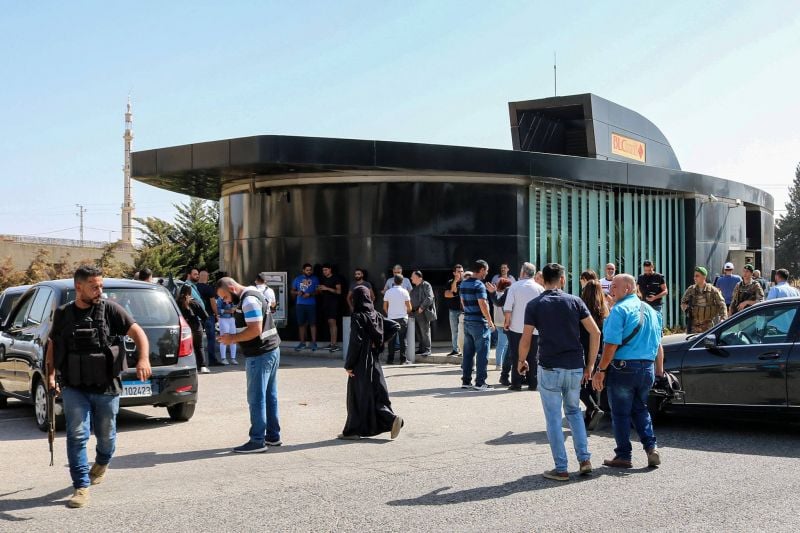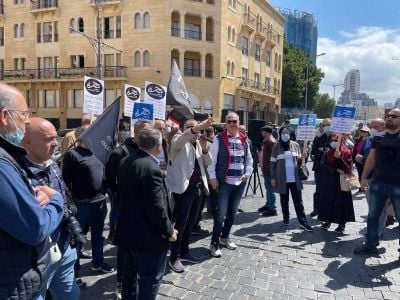
Lebanese security forces gather in the vicinity of BLC Bank in the town of Chtaura in Lebanon's eastern Bekaa valley on Oct. 4, 2022, where a man held people hostage seeking to send money to his son in Ukraine. (Credit: HASSAN JARRAH / AFP)
BEIRUT — Several operations were carried out against banks by depositors across Lebanon on Tuesday, with mixed results.
The first holdup took place in a branch of the Lebanese Bank for Commerce (BLC) in Chtaura, in the Bekaa, by a man who did not manage to withdraw any money from his account. The second incident unfolded in a branch of the First National Bank (FNB) in Tripoli, North Lebanon, and a third in a Byblos Bank branch in Sour.
In Hazmieh, in the suburbs of Beirut, a man organized a sit-in a branch of Intercontinental Bank of Lebanon (IBL) in an attempt to claim part of his savings.
These holdups occurred one day after the lawyers' collective Mouttahidoun (Arabic for "united") — which supports depositors who forcibly withdraw their own money from banks — announced depositors' intentions to stage a series of actions against banks on Tuesday.
In Chtaura, depositor Ali Sahili entered BLC bank armed to demand his savings of $24,502, according to L'Orient Today's correspondent in the Bekaa. The Cry of the Depositors, a group associated with previous holdups, told L'Orient Today that Ali Sahili is a retiree of the Internal Security Forces.
According to the group, Sahili "has already asked several times for the bank to pay him $4,300 for his son who is in Ukraine, who was expelled from the university due to non-payment of tuition fees and evicted from his home."
According to al-Jadeed, an employee of the bank seized Ali Sahili's weapon and expelled him from the bank before he was able to withdraw his money. L'Orient Today's correspondent reported that Sahili was later arrested by the security forces.
A lawyer from Mouttahidoun went to the police station in Chtaura to defend the arrested depositor, at the depositor's request.
A video uploaded to Twitter Tuesday morning appeared to share footage of the Chtaura holdup. In the video, a man can be seen holding what appears to be a gun.
The United Alliance and the Cry of the Depositors Association released a statement saying that the Lebanese Army's Chtaura wing is still listening to the testimony of depositor Ali Sahili, in the presence of his attorney, Fatima Fawaz, from the United Alliance, and the regional director of BLC Bank in the Bekaa.
The bank did not press charges and vowed to transfer $4,300 to Sahili’s son who is studying medicine abroad and to keep the account with US dollars open.
The investigation, led by Bekaa public prosecutor Judge Munif Barakat, is set to be finished by tomorrow and it is expected that a settlement will be reached due to the depositor’s health condition.
'We will not allow this'
In northern Lebanon, employees of Electricity of Qadisha broke into a branch of First National Bank (FNB), L'Orient Today's correspondent in the region reported.
Employees of Electricity of Qadicha said they raided the Tripoli branch of FNB because the bank decided to withhold 3 percent of their salaries, according to L'Orient Today's correspondent.
The employees, who claim to have not received any of their salaries yet, said that they will not leave the bank until management reverses its decision.
"The bank has not paid us our salaries and wants to deduct 3 percent of our salaries and other rights, the equivalent of LL500,000," said the employees. "We will not allow this, and we will remain inside the bank until the management reverses this decision."
The interruption was brief, according to L'Orient Today's correspondent, and employees left without obtaining any guarantees from the bank that they will cancel the fees.
'All calm here'
In the early afternoon, an employee at Intercontinental Bank of Lebanon (IBL) in Hazmiyeh confirmed to L'Orient Today that a depositor entered the bank demanding his money without using violence. According to the Depositors' Union, the man, George Siam, said he won't leave until he can obtain an undisclosed sum from his bank amount.
"It's all calm here, these things happen all the time in every bank," said the employee.
In Sour, Ali Hassan Hodroj — who infiltrated a Byblos Bank branch while armed — negotiated with the bank and managed to withdraw LL352 million from his account before handing himself over to ISF, according to the Cry of the Depositors association.
On Monday, a depositor accompanied by several unarmed accomplices had restored his savings by force in a branch of Blom Bank in Haret Hreik, in the southern suburbs of Beirut. The depositor, Zaher Khawaja, recovered the approximately $11,000 in savings.
"There has been coordination with the Cry of the Depositors association to appoint lawyer and activist Rami Ollaik, founder of Mouttahidoun, as his defense lawyer," the association announced on Facebook.
It also said a settlement was reached with the bank, in which Khawaja was allowed to keep his savings and the bank won't file any charges against him.
On Monday, Ollaik told L'Orient Today that actions against several banks were planned for Tuesday in Mount Lebanon and the Bekaa. On Tuesday, he told L'Orient Today that an action was initially scheduled to take place at a BLC Bank in Zahle, but was canceled because employees contracted COVID-19.
This succession of incidents is reminiscent of the series of holdups that took place in Lebanon last month, when seven bank holdups occurred between Sept. 14 and 16.
ABL explains itself
After Tuesday's day of actions against banks, the Association of Banks in Lebanon (ABL) has once again tried, in a long statement published Tuesday afternoon, to relativize its responsibility in the crisis the country is going through.
The association said it considers the state and Banque du Liban as those primary responsible, indicating that the state had withdrawn from BDL no less than $62.67 billion until "June 21, 2022," which was largely spent on the stabilization of the rate of the Lebanese lira for more than two decades, high interest rates, or the advances of the Treasury to Electricité du Liban whose rates have been frozen since 1994.
"Could the banks have opposed the financial and monetary policies decided by the state and the BDL?" the association also said, which it responded to by saying the banks had been forced to deposit foreign currencies into BDL and that their freedom to invest abroad was limited by regulations.
The ABL then said that state authorities and BDL had the means to limit the crisis' consequences at its onset, by adopting a law establishing formal capital controls. In this regard, ABL pointed out that foreign exchange reserves have fallen from $33 billion at the end of 2019 to "around" $10 billion today — a number that is difficult to verify given BDL's lack of transparency in this area.
The ABL insisted that depositors' money has been squandered by the public sector and that people's anger should be directed toward state institutions.
It also calls for the adoption of a reform plan that is approved by the International Monetary Fund, as well as other reforms that the fund requires before any financial aid is released to the country — conditions listed in the preliminary agreement reached with Lebanon last April 7.
An important note, however, is that ABL has long disagreed with the IMF's preferred approach to loss sharing, which included minimizing the role of the state and rejecting any solution aimed at creating a state asset management fund whose revenues would have helped offset some of their losses as well as those of large depositors.
Correction: This article has been updated to reflect the fact that Ali Sahili was arrested before he could forcibly withdraw money from his account. An earlier version this article incorrectly stated Sahili managed to successfully withdraw funds.

